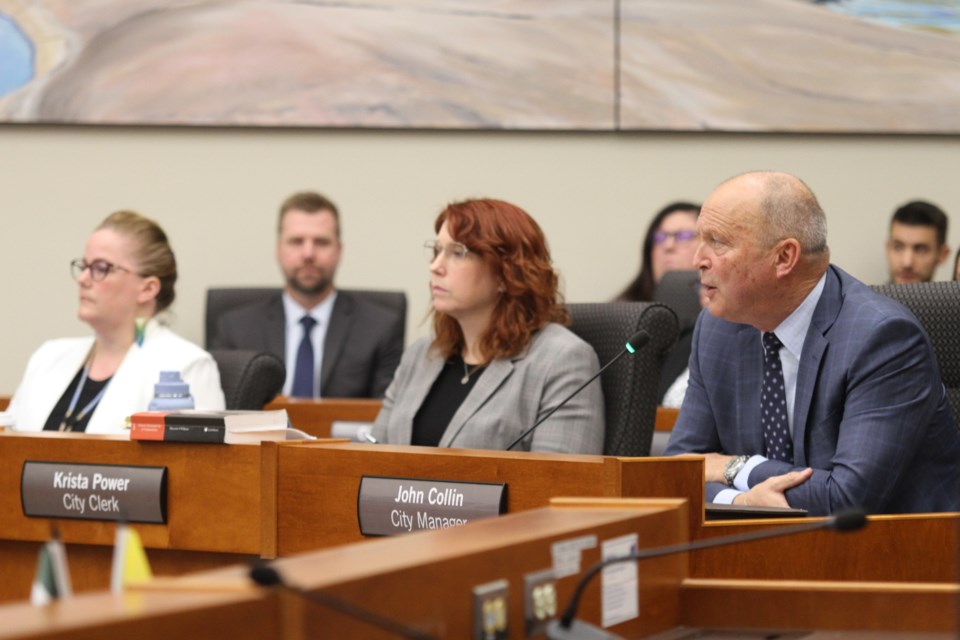THUNDER BAY – Increasing efficiency is the primary goal of a governance review underway at city hall.
City Council has voted to allow Krista Power, Director of Legislative Services & City Clerk, to continue working on a plan for a new governance structure that would change how council functions, in particular looking a change towards standing committees.
A finalized procedural by-law be brought back to council forward for approval on or before June 30, 2025, to take effect Sept. 1, 2025.
Under the new system, Powers explained to council, committee of the whole and city council meetings would be interspersed with a rotation of standing committee meetings. The standing committees would be divided into a six-week rotation with the committees on growth, finance and administration, and quality of life meeting on odd numbered of weeks, with special committee of the whole and regular city council meetings taking place on even numbered weeks.
The mayor would sit on every standing committee, alongside three to four councillors.
The special committee of the whole meetings would be a forum for matters that are larger in scope than any particular standing committee, allowing the full council to discuss larger development projects as well as closed sessions.
The word ‘efficiency’ was repeated often between administration and council as the move to a standing committee would allow smaller groups of council members to discuss agenda ideas before they brought to a city council meeting for ratification.
“When administration is bringing a report, they're bringing a report to that standing committee, that standing committee has familiarity and understanding with that topic. Whether it's growth, quality of life, or finance and administration, the folks that are speaking on behalf of administration from that area have that subject matter expertise. So, there's a fluidity there and a better understanding which potentially makes those meetings more efficient,” Power said.
Power also noted that a standing committee would offer an opportunity for the public to engage with administration more rather than going to a councillor.
“It's following the release of that report that we actually find out what the public thinks, and we find that out when they contact (council). So that means they haven't necessarily engaged with us,” said Power.
“We really want them to do that in an earlier time frame, so we can bring you the best information. So, that's an area I would say is more efficient.”
However, Power does note that one of the challenges to a standing committee is the potential for duplication of work.
“It's important to note that we don't want to see a structure where it's Groundhog Day: something goes to a standing committee, it's debated and discussed in significant measure and then it comes to City Council and then it's the same happens there where there is potentially duplication,” said Power.
“That wouldn't be the best use of council's time nor administration's.”
City Manager John Collin added that although each standing committee will have four or five councillors sitting on it, it is still up to all councillors to do their due diligence.
During a city council meeting, time will still be provided for a councillor not sitting on a specific standing committee to ask questions of administration about their recommendations.
However, it would be up to the councillor to obtain that information by either sitting on the standing committee or making sure they are reading administrative reports.
Coun. Mark Bentz and Coun. Rajni Agarwal pointed out that moving to a standing committee could potentially leave open the possibility of some councillors not doing their due diligence and reviewing all the reports.
Bentz said, “we want to develop experts and you'll have four councillors that are experts in this area and the mayor and that's only five people who will be making a recommendation to 13 around the table. And each councollor here will not be as knowledgeable as they now are on two-thirds of the business we're doing.”
Agarwal added to Bentz’s comment with an example of a level of engagement with other committees outside the one she would potentially be sitting on.
“I trust him. He did the work. He's brought the report to council. I had a busy week. I'm not reading the report and that shouldn't happen, but it can happen because we don't have the same engagement requirement. I'm afraid with only one committee per councillor that does concern me, even though, we are supposed to read every report,” said Agarwal.
“I can tell you, I haven't read every single report that's come before me. I've read the majority of them, but not every single one and I'm admitting my own guilt.”
Power said that the due diligence of understanding any recommendation presented by administration is up to every councillor sitting around the council chamber.
“It's up to you. How much you engage, whether it's committee of the whole or standing committees, that's up to you,” Power said.
“You make you are the final decision makers, whether you sit at committee of the whole or you sit at a standing committee.”
“I think your constituency expects you to be engaged, informed and listening.”
